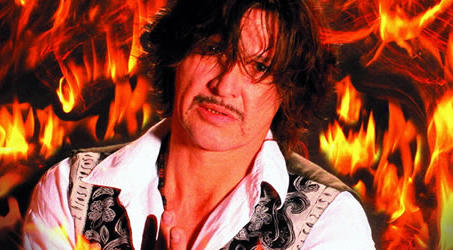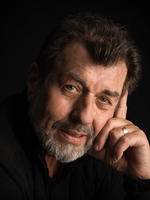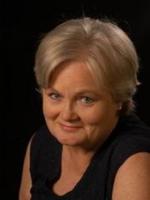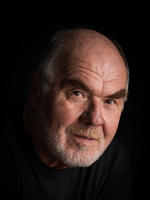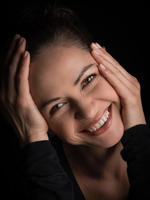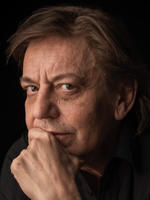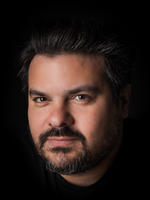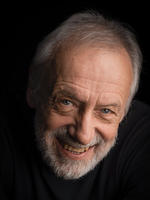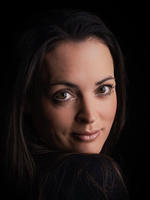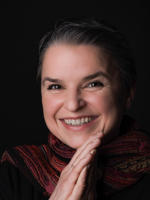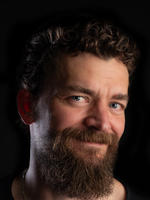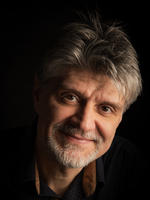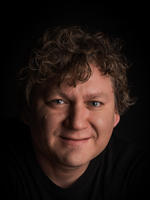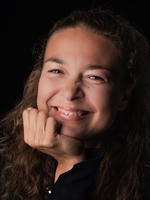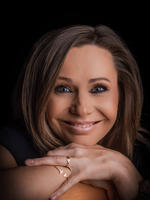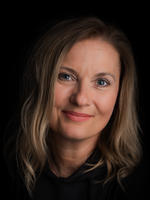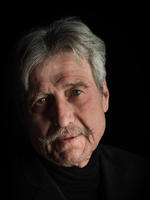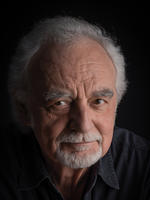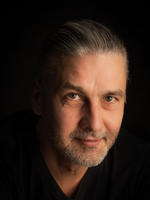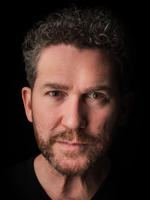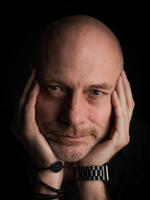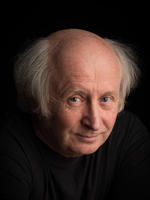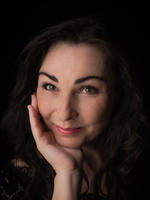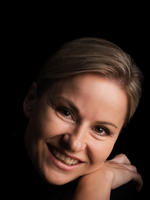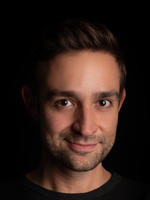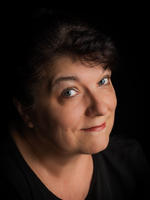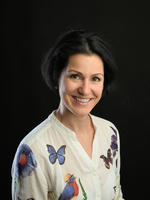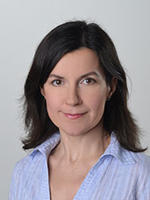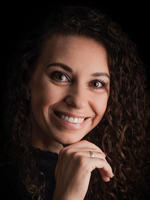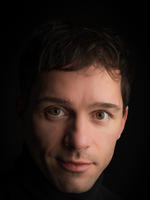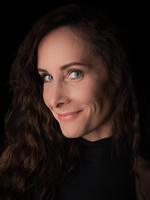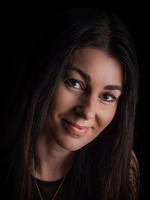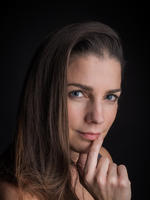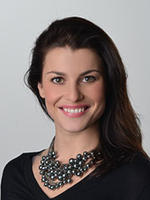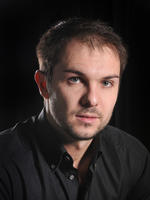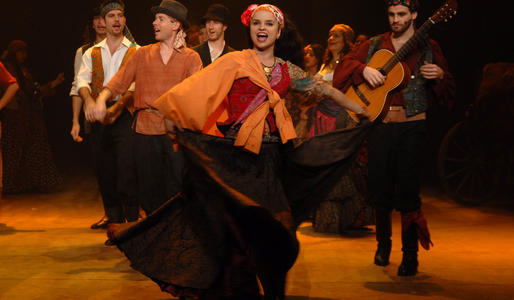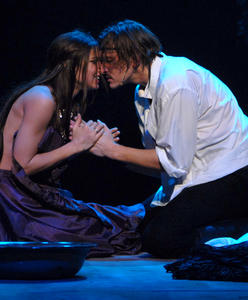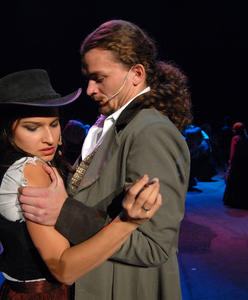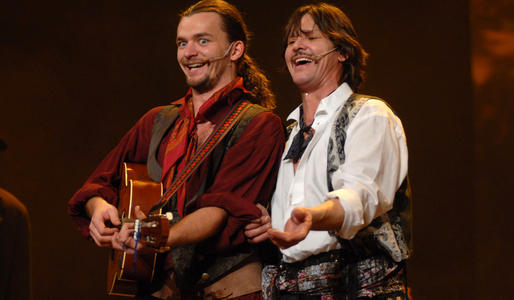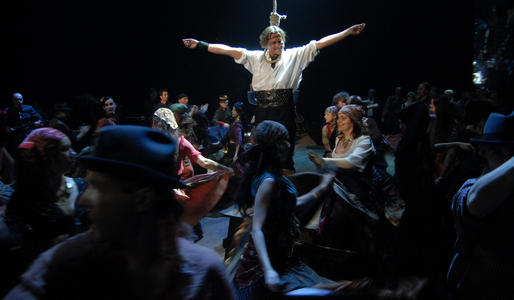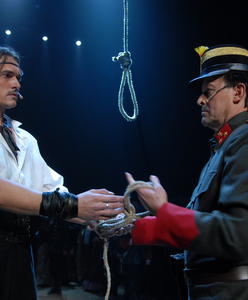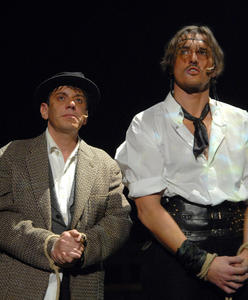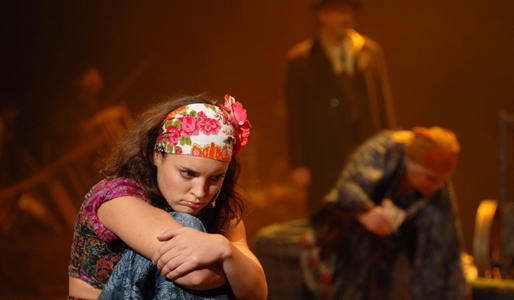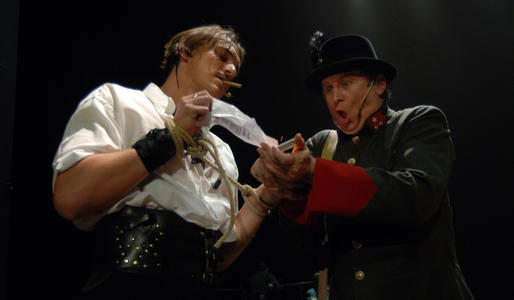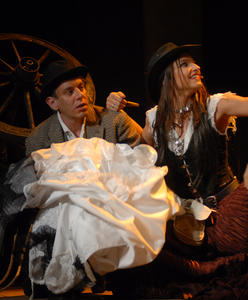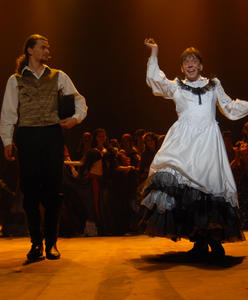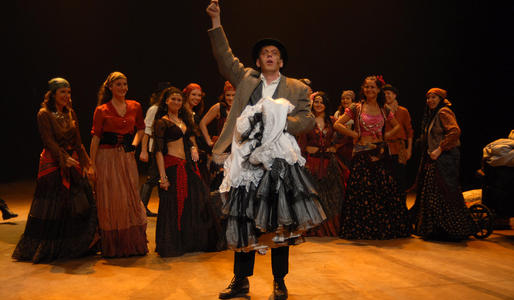The Freedom of Zobar and Rada – The Solitude Born of Pride
Jiří P. Kříž 28. December 2006 zdroj Právo
Kracik and Kloubek made the musical The Gypsies Go to Heaven perfect at the Brno City Theatre
What is said in the subtitle is just a half true. In fact, the adaptation and the direction (Kracik) and the choreography (Kloubek) would be too little without the costumes by Andrea Kučerová, without the stage design by Jaroslav Milfajt, without the gypsy songs trained by the choirmistress Jana Hrušková, and particularly without the ensemble of fifty-eight acting soloists up to the last member of the company, not including the excellent Brno City Theatre orchestra conducted by Karel Cón.
The arrival of spectators to the Music Scene is impressive. Right in the hall they are lost in the mist of the Carpathians with marshy lakes which change into rivers and their springs. The rummage of gypsy camps along the stage sides is transformed easily into horse pens, town marketplaces and a scaffold, barracks or Balint's country saloon, these all with surmised views of the mountain pastures...
They won't arrive by Charles's Wain
The introductory melody of the overture of the Gypsies on their way to heaven is whistled to the silence. It impressed spectators of the unrepeatable film by Emil Lotyanu and Evgeny Doga as early as in the year 1977. The group of Galician gypsies of Nemco Nur and the group of Luyko Zobar get out of the mist of history with their song Romano drom (The Way Home): Jaj, bare verdaneha na dotraden... Oh, they won't arrive by Charles's Wain...
Shall I remember you of the story of the greatest hoarse-stealer Zobar and the gypsy wise woman Rada, the two souls so free and wild that they cannot belong to anybody else but each other, but just at the moment of death? Their exciting provocativeness was described by the old gypsy Makar Czudra in the first literary fruit by Maxim Gorky (1892).
It is typical that Czudra was given more space in the dramatic version of the script written by Jindřich Janda and Milivoj Uzelac than in the Lotyanu's film. The role of Czurda is played by Ladislav Lakomý, celebrating his seventy-fifth birthday, who came back to his "mother theatre" for a while.
Kracik’s version of Gypsies is one of the most authentic productions based on the film version, which is exceeded with scenic monumentality and additional songs performed by precise Dušan Vitázek (Aralambi) or Jan Apolenář (Bucza).
From the moon dust
It is important to have protagonists of the gypsy duo of Romeo and Juliet or Tony and Maria (West Side Story), stress the producers in the choreography of the last scene). Traditionally, the luxury of three alternations was afforded in Brno: Zobar is played by Martin Havelka, Petr Štěpán, Stanislav Slovák, Rada by Ivana Vaňková, Soňa Jányová and Jitka Čvančarová.
Havelka proved his excellent dramatic and vocal condition at the premiere. The he-mannish, go-getting, unscalable and irresistible Zobar is prodigiously near to his soul and nature. Rada played by Vaňková is an ethereal, tender and beautiful wise woman. She resembles a fairy created of the moon dust. Her pride and adherence to the freedom is, similarly to Zobar, paid for with death.
I have not had an opportunity to see further protagonists, but I will surely see them. (I have seen the film eight times).
I have no skirt, I have no dress
I waited impatiently for the best-known song. It is sung by thirteen-year-old Alena Buzyleva in the film. It almost seemed they would not include it!
It was inserted before the tragic end, not in the first Zobar's visit to the Galician camp. Nane cocha, nane gad (I have no skirt, I have no dress), Evelína Jirková (Zobar's sister Rusalina) started. You know the feeling that makes you shudder...
Oh, there is too little place for compliments left. Well, at least the passing ones to Oldřich Smysl (Bubulya), Pavla Ptáčková (Julischka), Igor Ondříček (Sziladi), Zdeněk Černín (Lieutenant Bilrot), Jiří Horký (Danilo), Eva Jelínková (another Gorký’s figure Izergil), Josef Jurásek (Balint), Michal Nevěčný (Schwob), Robert Jícha (Istvan)...
The Gypsies going to heaven got to the stars in Brno. The Brno City Theatre is an impregnable musical fort at present. The sensation of the autumn, The Golem at the Prague Hybernia Theatre, is just a jackleg blether if compared with this musical...
Gypsies represent an almost unsurmountable peak.
The Gypsies Are Aiming High Enough
Jan Šmikmátor 12. December 2006 zdroj Rovnost
The Brno City Theatre seems to have found finally its way to a more demanding spectator who is fed up with television variety shows and does not want to be bored. At the end of the last month a performance of the famous film musical The Gypsies Go to Heaven was presented.
The story of unhappy love of a horse-stealer Loyko Zobar and a wise woman Rada is unwound at the Music Scene under the direction of Petr Kracik (guest) with all attributes of a “big screen”. So big that there is no place for an orchestra left and a recording must be used. But the atmosphere is underlined by a live cymbal band on the stage.
One of Rada’s representatives, Soňa Jányová, so far an ordinary member of the ensemble, is undoubtedly a discovery. Her Rada is mystic, fatalistic, new and impressive. Another five-star performance was presented by Ján Jackuliak acting Aralambi.
Stormy ovations were also received by Alan Novotný playing a boastful jackleg Butcho. However, it looks like he “borrowed” his expression and gestures from the previous title –The Squabbles of Chioggia by Goldoni.
Perhaps, the impression of authenticity and rawness was the principal goal of the producers – it breathes to the spectator at every turn: With the never-ending tobacco whiffing, the excellent costumes designed by Andrea Kučerová or the well-developed choreography by Vladimír Kloubek. Verdict: An unambiguous success.
No Petition Has Come Yet
(jaz) 27. November 2006 zdroj MF Dnes
The Brno City Theatre introduced the newly studied narrative musical The Gypsies Go to Heaven
The members of the Brno City Theatre ensemble played and sang vivaciously, passionately and proudly on Saturday evening. They put on a premiere of the narrative musical The Gypsies Go to Heaven at the Music Scene.
The balladic story, which film version succeeded as early as at the end of the 1970's did not disappoint the theatre-goers either. Both the weekend premieres were sold out.
"I have said all notes and texts and have lived through the performance without any accident. No petition of the Romanies, to indicate any defects, has come yet, so I would say that the Brno Gypsies have gone to heaven in good order," Martin Havelka, the protagonist of the horse-stealer Luyko Zobar said. Havelka grew a moustache because of the role.
This time, eighty actors directed by Petr Kracik appeared on the stage. The South Moravian actors avoided the Czech texts by Pavel Vrba - the five-member cymbal band with a Romany violinist played to Romany texts. The guitar, the mandolin and the contrabass were heard.
"I do not sit in the auditorium at first nights, I try to be in some other place in my mind, as I cannot already influence anything. However, I also make exceptions. During the Brno premiere I was at the backstage," the director said.
The Magazine, Korean, the Seducer and Jesus from Brno
Luboš Mareček 1. November 2006 zdroj MF Dnes
The dramatic Brno was nicely variegated as regards its offer in the autumn. Which is good, but a nit-picker looks for various values in this glossary.
The audience can be got round with the comedy The Squabbles of Chioggia, ground off by ages, chosen by the Brno City Theatre. Fortunately, the Goldoni's evergreen did not become an obligatory funny item of the repertoire in the direction by Zdeněk Černín. Černín let bang the world of contentious Italians from a fisherman’s backcountry against the sterile world of current telenovels. Goldoni was a clear winner – not only in this optics.
The musical The Gypsies Go to Heaven is a novelty under the same theatrical mark. The former iconic film of socialist cinemas will offer an impressive vocal, music and dancing show at the Music Scene of the Brno City Theatre. The orchestra and the choir pulse in hymnic tones, the live cymbal band on the stage and the texts sung in Romany are pungent with animality. The performance really works. Perhaps just the grandiose and snobbish gemmy gate on the horizon opposes to the simple and free life of the Gypsies for whom the freedom is more valuable than life.
The Gypsies Also Go to Heaven in Brno
Peter Stoličný 1. December -1 zdroj www.divadlo.sk
Several years have passed since November 2001, when you could see the musical The Gypsies Go to Heaven at the New Scene in Bratislava and it is time to recapitulate. We can compare the inventive space choreography by Ján Ďurovčík with the brilliant theatrical choreography by Vladimír Kloubek of the Brno performance. We can compare the libretto by Jindřich Janda and its translation by poet Kamil Peteraj executed for the Bratislava’s performance and the Bratislava’s direction with Petr Kracik’s directorial adaptations made in Brno. Both the performances got a little away from the original film script written by Emil Lotyanu. The Bratislava’s story was nearer to the film version, which was surely accepted by admirers of the Mosfilm’s work with satisfaction. The Brno’s version was more theatrical, but with somewhat embarrassed conclusion. First, a hoarse-stealer Zobar says to the Gypsies: “I have decided brothers. As Rada ordered me, I’ll bow to her feet and kiss her right hand...” But suddenly he changes his decision, overcome by his sense of freedom and orders to his beloved Rada: “Hand! Give me your hand!” Rada does not agree, she wants him to do as they have agreed, to bow to her and kiss her hand. And Zobar knifes her to death and is knifed to death by Father Danilo. The drama culminates with the dead lovers embracing each other.
As far as I can remember, the death of the lovers was preceded in the film and the Bratislava’s production with a sensual dancing dominated clearly by Rada’s inflexibility leading Zobar to a desperate act of murder. I was missing the dancing in the Brno’s performance. But this is the first and simultaneously the last critical note.
If we compare the Bratislava’s and the Brno’s performance, it is possible to say that in spite of the huge endeavour of the New Scene’s protagonists, the Brno’s musical was more consistent. More theatrical. Although mature personalities, actors I really respect, acted in Bratislava (Gogál, Paveleková, Hasprová, Rysová, Norisová, Benedikt, Heller, Čálik), in Brno you could see exceptionally universal artists with excellent qualities for musical. It is difficult to say which is better: their acting, singing or motion. Izergil - Eva Jelínková, Rada - Ivana Vaňková, Danilo - Jiří Horký, Buča - Jan Apolenář, Zobar - Martin Havelka or old Zobar - Marian Slovák. (By the way, I am sorry I did not see old Zobar acted by Marián Slovák in Bratislava with his son Lujko Zobar who was played by his real son, Stano Slovák, the Brno musical star – that could be very interesting).
The costumes designed by Andrea Kučerová and the simple stage designed by Jaroslav Milfajt were extraordinarily successful. Live music on the stage and beautiful choirs were studied by conductor Karel Cón in Brno. As far as I can remember, I was not so satisfied with the Bratislava’s music performance studied by Anton Popovič. It gave an impression of exaggerated variety of genres and styles.
I think it can be said that the work is a sure-thing bet. And when the news about these Gypsies will get among the Romanis living in Brno, mainly in the nearby Bratislavská Street, there can be problems like once in Bucharest where the local Gypsies wanted to get to the theatre free of charge because THEIR story was played there. By the way, this funny information is given in the rich bulletin functioning as a script and iconographic material, but mainly a detailed guide of the history of Gypsies – Romanis with explanation where the terms came from.
Undoubtedly, The Gypsies Go to Heaven will always be a sold-out title in Brno. But I do not know how the director Stanislav Moša wants to include it in the repertoire. It is the sixth premiere this year. And eleven (!) live titles are played only at the Music Scene at present.
If only other theatres had such a dilemma...

